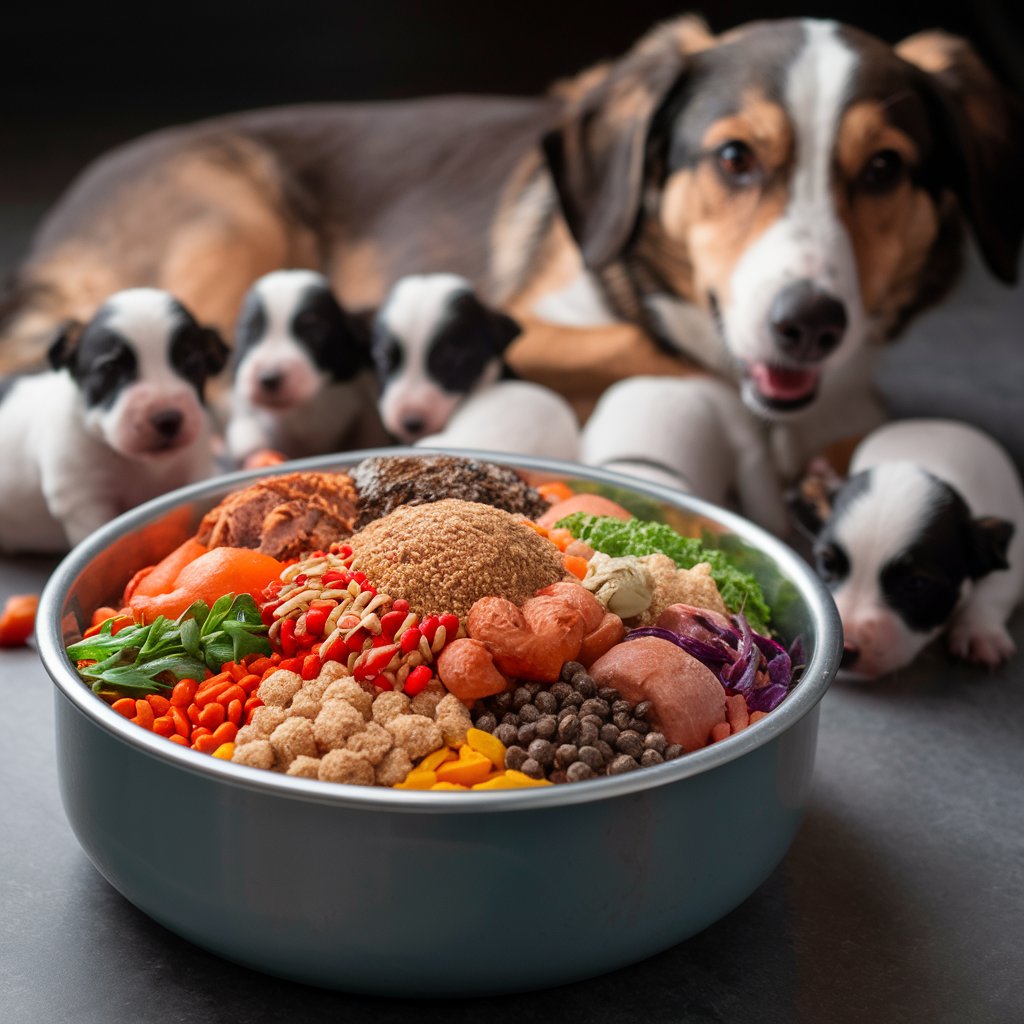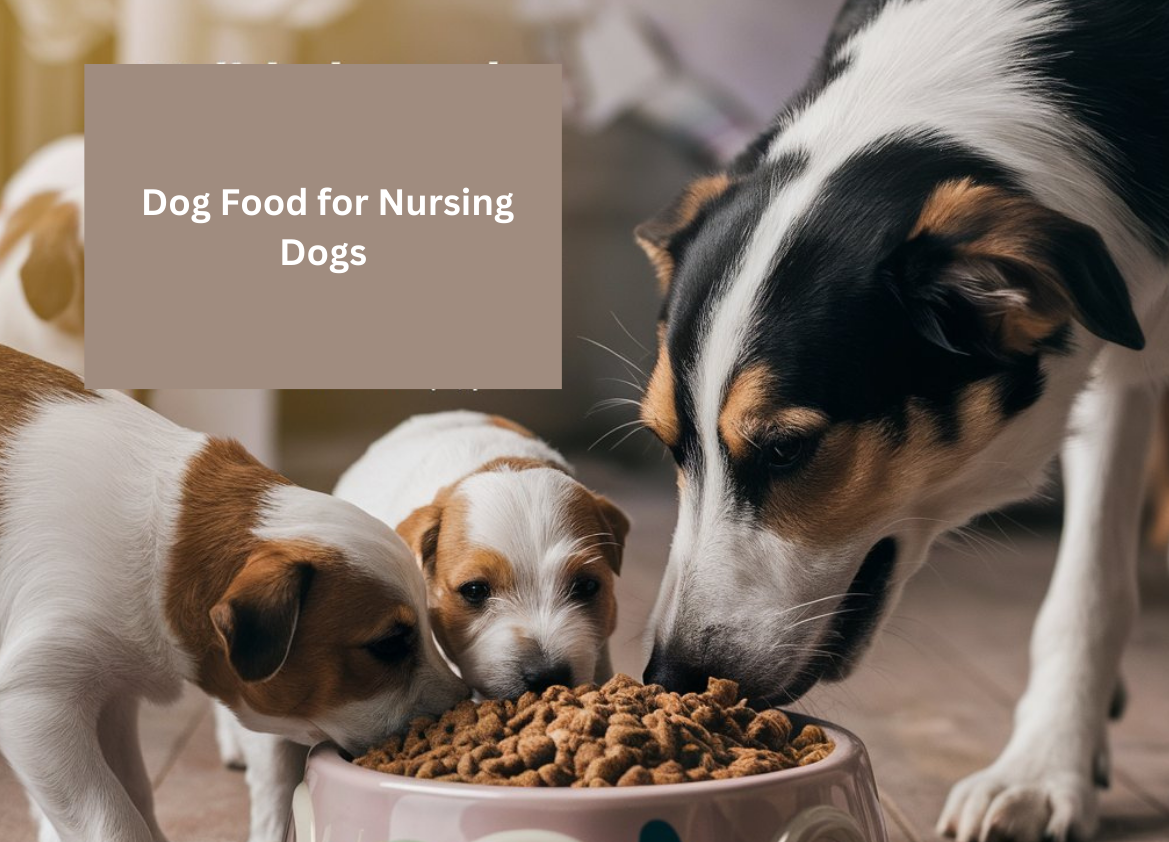Choosing the Right Dog Food for Nursing Dogs: A Guide for New Pet Parents
You’ve got a new litter of puppies, and you’re probably wondering about the best dog food for nursing dogs to keep your furry mum healthy and strong. It’s a big responsibility, and you want to make sure she’s getting all the nutrients she needs to produce enough milk for her pups.
It’s not just about feeding her enough calories, it’s about getting the right balance of protein, fats, vitamins, and minerals. Just like humans, nursing dogs need a boost in their diet to support their extra workload.
The Nutritional Needs of Nursing Dogs
A nursing dog’s nutritional requirements are significantly higher than a regular adult dog. They need extra calories to fuel their milk production, and extra protein to rebuild their own tissues after pregnancy and birth. Getting the right blend of nutrients can seem daunting, but it doesn’t have to be.
- Increased Calorie Requirements:
- Nursing dogs need significantly more energy to produce milk.
- To get an idea of how much more, think about this: a nursing dog needs almost double the calories of a non-pregnant, non-nursing dog.
- Feeding a high-calorie dog food for lactating dogs is crucial.
Increased Protein Needs:
- Milk is packed with protein, which means nursing dogs need lots of it to replace the protein lost through their milk.
- This is why high-quality protein sources are essential in dog food for nursing mothers.
Essential Vitamins and Minerals:
- A nursing dog needs a range of vitamins and minerals to support both her own health and the growth and development of her puppies.
- Dog food for pregnant dogs should be formulated with added vitamins and minerals that are especially important for lactation.
Colostrum:
- Colostrum is the first milk produced by a mother after giving birth.
- It’s packed with antibodies that give puppies essential immunity during their first few weeks of life.
- Dog food with colostrum can help boost the puppies’ immune systems, but remember it’s not the only source of antibodies.
Best Dog Food Options for Nursing Dogs
There are a variety of dog food options available to support nursing mothers, each offering different advantages.
- High-Quality Puppy Food:
- Good quality puppy food is a great starting point for dog food for nursing dogs.
- It’s formulated with higher calorie and protein levels.
- Look for puppy food with added vitamins and minerals, especially those that support bone and joint development.
- Wet Food for Nursing Dogs:
- Wet food offers a higher moisture content and calorie density compared to dry food which is ideal for nursing dogs.
- The increased moisture can help keep dogs hydrated, especially if they’re feeling sluggish after giving birth.
- It can also be more appealing to dogs who might be off their food.
- Supplements for Nursing Dogs:
- Supplements can add extra nutrients to your dog’s diet, particularly if you’re not sure if her current food is providing enough.
- Popular options include dog milk replacer and multivitamins.
- Dog milk or a milk replacer can provide an extra boost of calcium and other nutrients for nursing dogs.
- It can also be helpful for puppies who are struggling to nurse.
- Always consult with your veterinarian before adding any supplements to your dog’s diet.
- Pet nutritionists can provide tailored recommendations based on your dog’s individual needs.
- Top Dog Food Brands for Nursing Dogs:
- Royal Canin is known for its specialized formulas for different life stages, including lactation.
- Purina also offers puppy food with increased caloric and protein content.
Factors To Consider When Choosing Dog Food for Nursing Dogs
You might be tempted to grab the first bag of puppy food you see, but choosing the right dog food for nursing dogs involves considering a few factors:
- Breed of Dog:
- Different breeds have different nutritional needs, especially when it comes to size and activity level.
- For example, dog food for large breed puppies needs to be formulated differently than dog food for small breed puppies.
- Age and Size of Puppies:
- The age and size of the puppies will also influence how much food your dog needs.
- Individual Dog Needs:
- All dogs are unique!
- Consider any allergies or sensitivities your dog might have.
- Some dogs might need a dog food for sensitive stomachs or a dog food for picky eaters.
- Budget:
- There’s a wide range of dog food prices, so choose a brand that fits your budget.
Tips for Feeding Nursing Dogs
You want to make sure your furry mum is getting enough to eat, but you also want to make sure she doesn’t gain too much weight.
- Feeding Frequency:
- Nursing dogs will need to eat more frequently than normal.
- This is because they are burning a lot of energy.
- Feed her at least 3-4 times a day, and more if she seems hungry.
- Portion Size:
- Start with the recommended amount on the food bag and adjust based on your dog’s weight and activity level.
- If your dog seems hungry, you can increase her portion size.
- If your dog seems overweight, reduce her portion size.
- Monitor Weight Gain:
- Weigh your dog regularly and make adjustments to her diet as needed.
- A healthy weight gain during pregnancy and lactation is normal, but excessive weight gain can be problematic.
- Gradual Transition to New Food:
- Don’t switch to a new dog food for nursing dogs suddenly.
- Mix the new food in with her old food gradually over several days to avoid digestive upset.
Resources and Support
You’re not alone in this journey! There are plenty of resources available to help you choose the best dog food for nursing dogs and ensure your furry friend has a healthy and fulfilling experience.
- Veterinarians:
- Your veterinarian can offer personalized recommendations based on your dog’s breed, age, and health status.
- They can also help you identify any potential nutritional deficiencies.
- Dog Breeders:
- Consult with breeders for advice and tips on dog food for postpartum dogs.
- Breeders often have extensive experience with raising puppies and know what works best.
- Pet Stores:
- Pet stores can offer guidance on different dog food brands and their suitability for nursing dogs.
- The Kennel Club:
- The Kennel Club can provide information on the nutritional needs of nursing dogs.
- American Kennel Club (AKC):
- The AKC offers resources on dog care, including feeding guidelines for puppies and pregnant and nursing dogs.
Taking care of a nursing dog can be demanding, but it’s also incredibly rewarding. Choosing the right dog food for nursing dogs plays a vital role in her well-being and the health of her puppies.
“## Choosing The Right Dog Food for Nursing Dogs – A Guide for New Pet Parents
Choosing the right dog food for nursing dogs can feel like a minefield, especially if you’re a first-time dog owner.
You want to make sure your furry friend is getting the right nutrients to produce enough milk for her pups.
What To Look For In Dog Food For Nursing Dogs
There are some essential things to look for in dog food for nursing dogs, beyond just calories.
- Ingredients:
- High-quality dog food ingredients are key, especially when it comes to protein.
- Choose foods with meats listed first on the ingredient list, followed by vegetables and fruits.
- Protein Content:
- Nursing dogs need more protein than normal dogs.
- Look for dog food with at least 25% protein.
- Fat Content:
- Fat is an important source of energy for nursing dogs.
- Look for dog food with 15-20% fat.
- Vitamins and Minerals:
- Nursing dogs need extra vitamins and minerals, especially calcium.
- Look for dog food fortified with added vitamins and minerals.
- Colostrum:
- Dog food with colostrum can help boost the immune system of puppies.
- It’s a good idea to start with a food that contains colostrum, but keep in mind that it’s not a substitute for the first milk that your dog produces.

Top Dog Food Brands For Nursing Dogs
There are tons of dog food brands in the market. Here are some of the top brands known for their quality dog food for nursing dogs and specific formulas:
- Royal Canin:
- They have a range of specialized formulas for different life stages, including lactation.
- Purina:
- This brand offers puppy food that’s formulated with increased caloric and protein content.
- Hill’s Science Diet:
- This brand is known for its research-backed formulas and high-quality ingredients.
- Eukanuba:
- A brand that focuses on providing complete nutrition for dogs of all ages and sizes.
Feeding Tips For Nursing Dogs
Feeding your nursing dog properly can be a game changer for both her and her pups.
- Feeding Frequency:
- Feed her at least three meals a day.
- Keep an eye on her eating habits, as she might need even more meals if she’s feeling hungry.
- Portion Size:
- Start with the recommended amount on the food bag.
- You can adjust the portion size based on your dog’s weight and activity level.
- Monitor Weight Gain:
- Weigh your dog regularly to make sure she’s maintaining a healthy weight.
- She might gain a bit of weight during pregnancy and lactation, but it shouldn’t be excessive.
- Transition Gradually:
- Don’t switch to a new dog food for nursing dogs suddenly.
- Mix a little bit of the new food with her old food, gradually increasing the amount of new food over a few days.
What If My Dog Doesn’t Like The Food?
If your dog is being fussy or not eating enough, don’t panic. It’s common for dogs to be a bit off their food after giving birth.
- Try different dog food brands or formulas until you find one that your dog likes.
- Consider adding wet food to her diet.
Extra Tips For Feeding Nursing Dogs
- Hydration is key: Make sure your dog has plenty of fresh water available at all times.
- Consider a milk replacer: If you’re concerned about your dog’s milk production or if the puppies are struggling to nurse, you can talk to your veterinarian about using a dog milk replacer.
- Don’t forget about treats: Offer healthy and nutritious treats, but in moderation.
The Bottom Line:
Choosing the right dog food for nursing dogs is essential for her health and the well-being of her puppies.
It can feel overwhelming, but by following these tips, you can get your furry friend the nutrition she needs to thrive.
FAQ
What should I look for in dog food for nursing dogs?
- High-quality ingredients with meat listed first
- At least 25% protein content
- 15-20% fat content
- Added vitamins and minerals, especially calcium
- Consider food with colostrum for immune support
How often should I feed my nursing dog?
- Feed at least 3-4 times a day
- Increase frequency if she seems hungry
How much should I feed my nursing dog?
- Start with the recommended amount on the food bag
- Adjust based on weight and activity level
- Monitor weight gain and adjust accordingly
What are some top dog food brands for nursing dogs?
- Royal Canin
- Purina
- Hill’s Science Diet
- Eukanuba
Should I use supplements for my nursing dog?
- Consult with your veterinarian first
- Consider dog milk replacer if recommended
- Multivitamins may be beneficial
How do I transition to new dog food?
- Mix new food with old food gradually
- Increase the amount of new food over several days
What if my dog doesn’t like the new food?
Consider adding wet food to her diet
Try different brands or formulas

